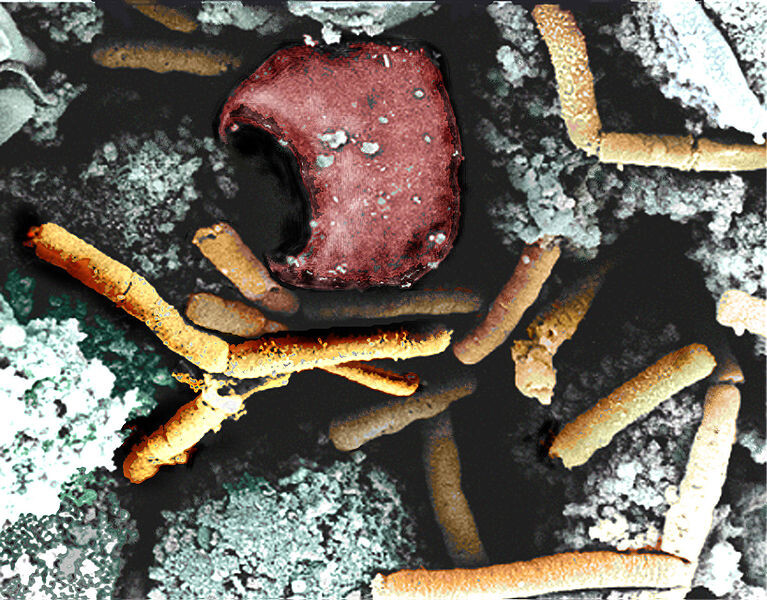hankyoreh
Links to other country sites 다른 나라 사이트 링크
Case of live anthrax on US military base raises questions of revising Status of Forces Agreement

Under current regulations, US can bring hazardous materials into S. Korea without notifying Seoul government
After live anthrax was mistakenly delivered to the Osan Air Force Base, which is operated by US Forces Korea (USFK), there is increasing pressure to revise the US-South Korea Status of Forces Agreement (SOFA), which currently allows the US to bring hazardous materials into South Korea without notifying the South Korean government.
The only way to eliminate the possibility of the US military indiscriminately developing biological weapons and other hazardous materials inside South Korea could be for the South Korean government to receive prior notification from the US military before it brings dangerous materials into South Korea and then manage and oversee those materials while they are in the country.
“Of the three countries in the world with the largest American military presence - South Korea, Japan, and Germany - South Korea is the only country that the US does not have to notify in advance or deliberate with about changes to the weapons systems or number of troops or bringing in hazardous weapons,” said Lee Jang-hee, professor at the law school at Hankuk University of Foreign Studies and co-president of Citizens’ Solidarity for Peace and Unification, in a telephone interview with the Hankyoreh on May 29.
“Since this is an issue that is directly connected with the safety of South Koreans, it only makes sense for the South Korean government to monitor and supervise the US military’s anthrax. The SOFA agreement needs to be revised to make this possible,” Lee said.
Article 9 of SOFA, which deals with customs and tariffs, states that customs officials of the South Korean government may not inspect military cargo that is en route to the US military.
Another question is whether the US violated international law when it sent hazardous materials that could be used as biological weapons to another country (though admittedly the final destination was an overseas US military base).
“It is possible that the very fact that the US moved anthrax, which is used as a biological weapon, to another country may contravene the Biological Weapons Convention,” said Jeong Uk-sik, president of the Peace Network.
“The US military runs drills in which it checks for anthrax and familiarizes soldiers with the response protocols in order to improve their ability to deal with the anthrax that the North Korean military is thought to possess,” an official with South Korea’s Ministry of National Defense said.
Bacillus anthracis, the bacteria that causes anthrax, is a dangerous pathogen that, upon entering the human body, produces toxins and damages immune cells, with a fatality rate of 95%.
According to a South Korean law concerning the prevention of infectious disease, anthrax and other highly dangerous pathogens must be reported to the South Korean Centers for Disease Control and Prevention. The US did not provide notification that it was bringing in anthrax samples because those samples were supposed to be inactive, the Centers for Disease Control and Prevention said.
In 1997, it was discovered after the fact that US troops in South Korea had been equipped with uranium shells, weaponry that had provoked controversy after the Gulf War because of radioactive contamination. At the time, US troops in South Korea initially denied having depleted uranium shells before eventually admitting that they had them but had never used them.
By Kim Ji-hoon, staff reporter and Kim Yang-joong, medical correspondent
Please direct questions or comments to [english@hani.co.kr]

Editorial・opinion
![[Column] Season 2 of special prosecutor probe may be coming to Korea soon [Column] Season 2 of special prosecutor probe may be coming to Korea soon](https://flexible.img.hani.co.kr/flexible/normal/500/300/imgdb/original/2024/0426/3317141030699447.jpg) [Column] Season 2 of special prosecutor probe may be coming to Korea soon
[Column] Season 2 of special prosecutor probe may be coming to Korea soon![[Column] Park Geun-hye déjà vu in Yoon Suk-yeol [Column] Park Geun-hye déjà vu in Yoon Suk-yeol](https://flexible.img.hani.co.kr/flexible/normal/500/300/imgdb/original/2024/0424/651713945113788.jpg) [Column] Park Geun-hye déjà vu in Yoon Suk-yeol
[Column] Park Geun-hye déjà vu in Yoon Suk-yeol- [Editorial] New weight of N. Korea’s nuclear threats makes dialogue all the more urgent
- [Guest essay] The real reason Korea’s new right wants to dub Rhee a founding father
- [Column] ‘Choson’: Is it time we start referring to N. Korea in its own terms?
- [Editorial] Japan’s rewriting of history with Korea has gone too far
- [Column] The president’s questionable capacity for dialogue
- [Column] Are chaebol firms just pizza pies for families to divvy up as they please?
- [Column] Has Korea, too, crossed the Rubicon on China?
- [Correspondent’s column] In Japan’s alliance with US, echoes of its past alliances with UK
Most viewed articles
- 1‘We must say no’: Seoul defense chief on Korean, USFK involvement in hypothetical Taiwan crisis
- 2N. Korean delegation’s trip to Iran shows how Pyongyang is leveraging ties with Moscow
- 3‘Weddingflation’ breaks the bank for Korean couples-to-be
- 4Korea sees more deaths than births for 52nd consecutive month in February
- 5[Editorial] New weight of N. Korea’s nuclear threats makes dialogue all the more urgent
- 6[Column] Has Korea, too, crossed the Rubicon on China?
- 7[Column] Park Geun-hye déjà vu in Yoon Suk-yeol
- 8[Guest essay] The real reason Korea’s new right wants to dub Rhee a founding father
- 9Amnesty notes ‘erosion’ of freedom of expression in Korea in annual human rights report
- 10[Reportage] On US campuses, student risk arrest as they call for divestment from Israel